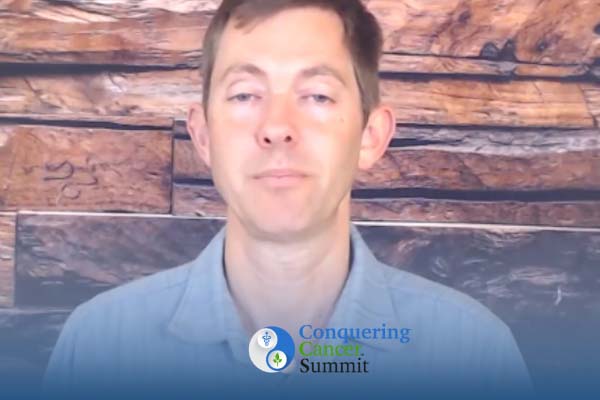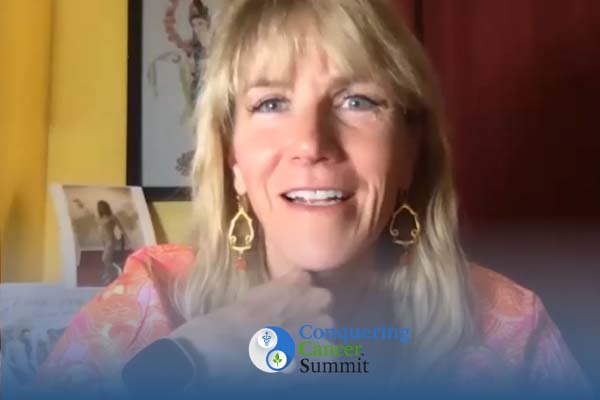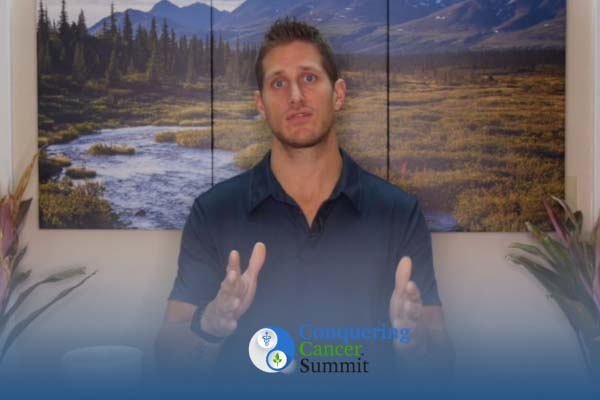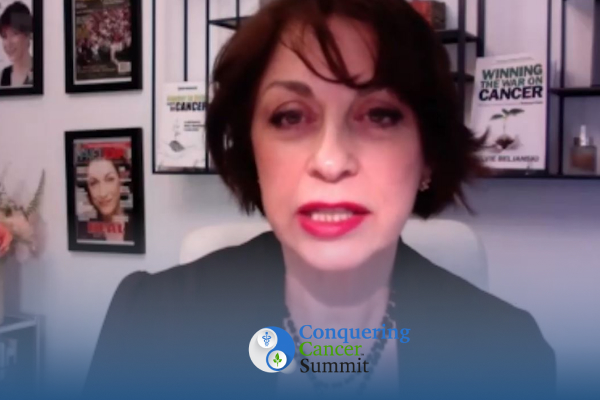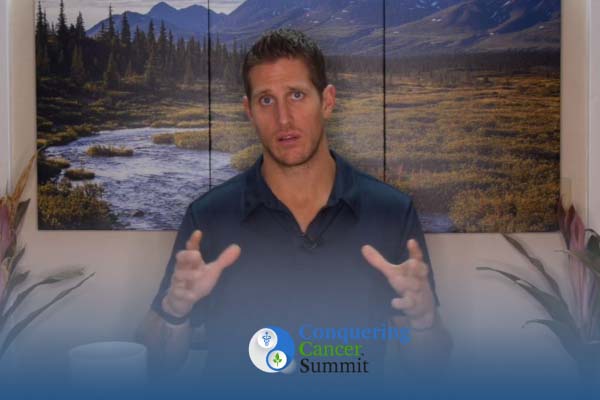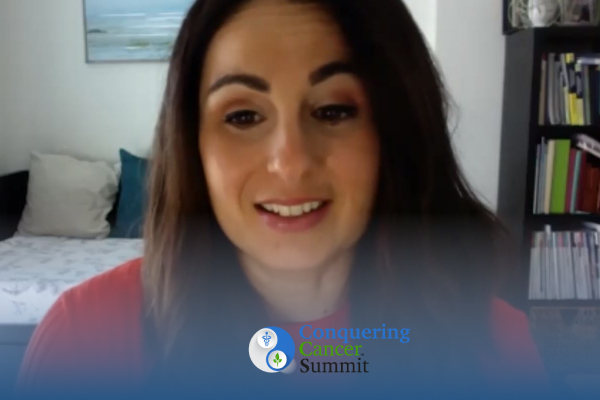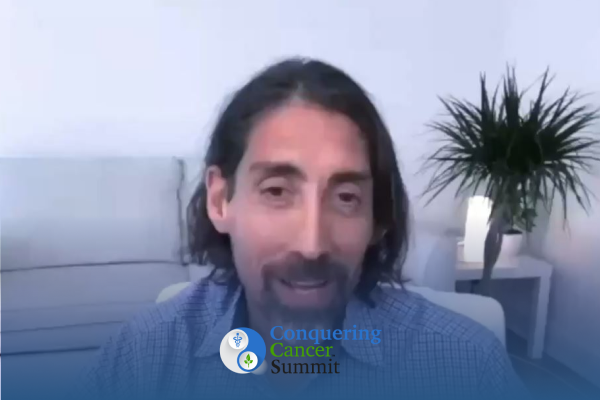Join the discussion below
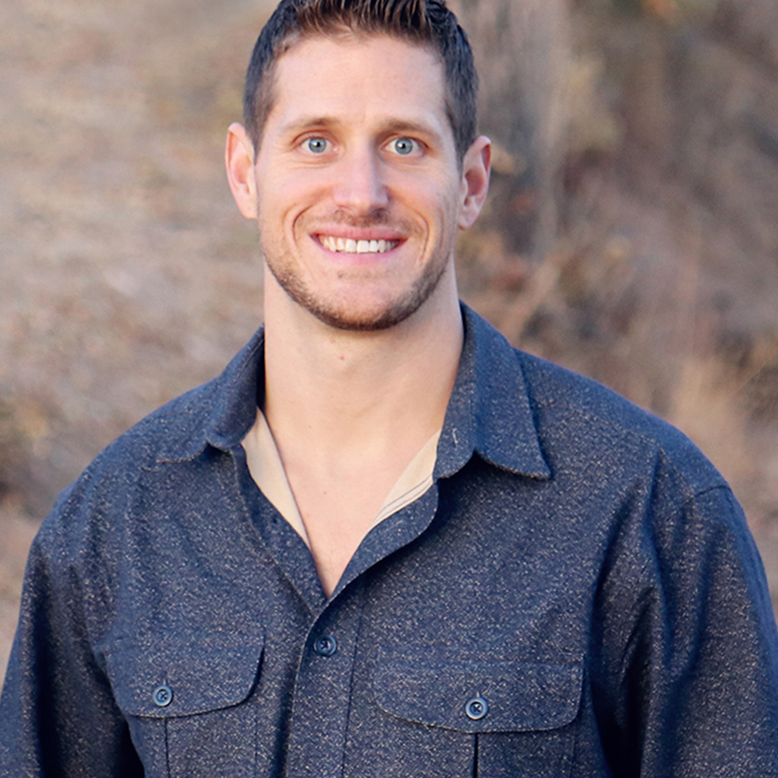
Nathan Crane is an award-winning author, inspirational speaker, plant-based athlete, event producer and 18x award-winning documentary filmmaker. Nathan is the Founder of The Panacea Community, Creator of the Global Cancer Symposium, and Director and Producer of the documentary film, Cancer; The Integrative Perspective. He is also the Director of Strategic... Read More
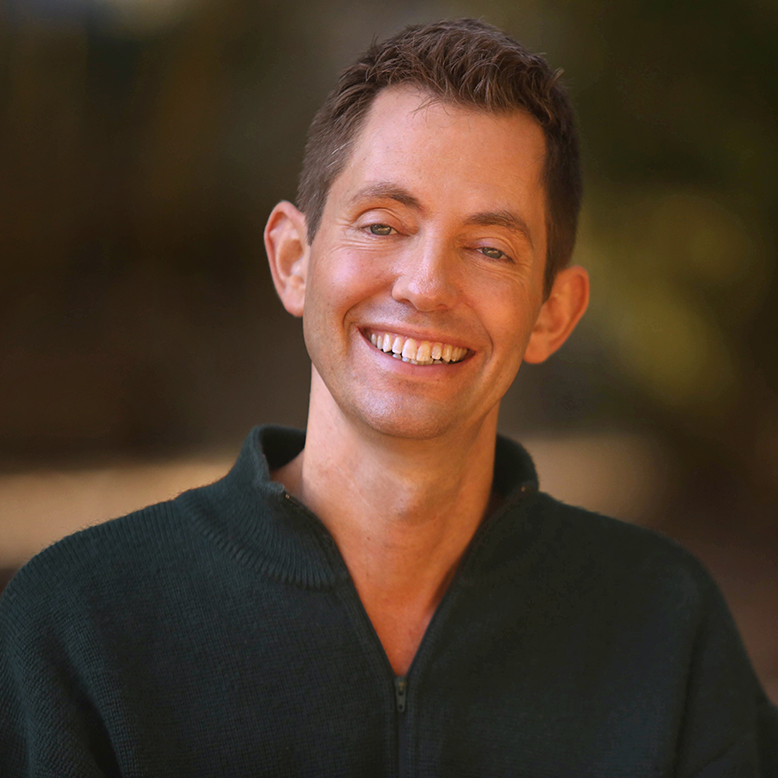
Ocean Robbins is co-founder & CEO of the 600,000 member Food Revolution Network. He is author of the bestseller, 31-Day Food Revolution: Heal Your Body, Feel Great, and Transform Your World. Ocean founded Youth for Environmental Sanity (YES!) at age 16, and directed it for the next 20 years. He... Read More
- The truth about organic vs conventional food and what is best.
- The science of Omegas and how most people’s omegas are out of balance.
- Proven foods that have the most anti-cancer properties.
- The most inflammatory foods that contribute to chronic inflammation and eventually cancer.
- The cancer-causing foods we all should avoid every day.
Related Topics
Alcohol, Animal Products, Cancer, Cancer Prevention, Co-factors, Common Foods, Food Principles, Greenwashed Food, Healing, Health, Human Body, Laboratory, Nutrition, Oil, Organic, Pesticides, Plant-based, Processed Foods, Processed Meats, Processing, Science, Sugar, Sugar Refinement, Toxicity, WholenessNathan Crane
Hey, it’s Nathan Crane, Director of the Health and Healing Club, and host of the Conquering Cancer Summit. And today, I am honored and excited to welcome you to a very special interview. So, Ocean Robbins, is a co-founder and CEO of the 600,000 member Food Revolution Network. He’s the author of the best seller, which is “31-Day Food Revolution: Heal Your Body”. “Feel Great” and “Transform Your World”.
Ocean founded Youth for Environmental Sanity, which of acronym is YES. As early as the age 16 years young, he had already founded this incredible organization and directed it for the next 20 years. He’s spoken in person to more than 200,000 people, organize online seminars and events reaching more than a million people around the world and facilitated leadership development events for leaders from 65 nations. He has served as adjunct professor for Chapman University and is a recipient of the national Jefferson Award for Outstanding Public Service. The Freedom’s Flame Award, the Harmon Wilkinson Award, and many other honors. It’s truly a joy and an honor and a privilege to have Ocean here with us. Make sure to take a look at foodrevolution.org to see how you can join the Food Revolution. Ocean, thank you so much for being here.
Ocean Robbins
Thrilled to be with you, Nathan, thanks for doing this.
Nathan Crane
So, you know, you have a fascinating history, family history. We may get into that a little bit as well but I’d love for us to really open up with, I think one of the most important questions for anybody dealing with cancer or any chronic disease for that matter, which is, what does the science actually tell us? You know, and you’ve interviewed many of the top researchers and experts and scientists and doctors on the planet looking at this research, right? So what does that science tell us about the foods and the most common foods we have today that are the most toxic to the human body?
Ocean Robbins
Well, first of all, let me just give a little bit of context. So, a lot of people think cancer comes out of nowhere, but it doesn’t, it’s the predictable outcome of a lifetime of certain habits and choices. And, you know, if you drive your car into a brick wall, the death certificate might say impalement by brick wall. But you know and I know that really it was bad driving that caused that death. And, you know, if you die of, if you get cancer, it doesn’t come with a little flag that says, Hey, I’m caused by, you know, this or that lifestyle choice you made over the last 30, or 40, or 50, or 70 years. But the end of the day reality is that certain choices radically increase the odds, or reduce them.
Research is telling us that less than 10% of all cases of cancer are essentially caused by genetics. The other 90 plus percent are caused by a combination of diet, lifestyle, and environmental factors. And so let’s break that down for a second. By diet, essentially, we mean the standard modern American diet, which is full of specifically processed foods, especially processed meats, it’s full of pesticides, contaminations of all kinds. It’s loaded up with sugar, and all of these things are linked to increased cancer likelihood of diagnosis and mortality. And then, when we look at lifestyle, we’re talking about mainly two things, which is cigarette smoking and also exercise issues.
So if you don’t smoke and you exercise a bunch and move your body well, and if you eat a healthy lifestyle, you can slash your risk of cancer. And by the way the third major factor is environmental factors. And that’s has a lot to do with the air we breathe, the water we drink, the contaminants in our homes, and keeping a clean, healthy, safe home can make a world of difference. Even if you don’t have the money to buy organically grown couches and clothes and, you know, get rid of synthetic carpeting, and all these other things that can all be linked to increased risk of cancer. You can still get an air filter, for example, and purify the air within your home. You know, you don’t have to buy super fancy water from Fiji. It comes in bottles.
You can actually get a water filter pretty economically. And then you can get rid of a lot of the contaminants that might enter your body through your water. So there’s steps we can take across the board to slash our risk, but we’re here to talk today about food. I founded Food Revolution Network and that’s my biggest passion. So let’s go a little deeper on that piece of it which represents about a third of our total cancer risk in total. So you could eat the perfect pristine diet and still get cancer, but your odds go down by about a third, okay? So the big problem foods that are causing the most issues again are gonna be sugar, processed junk, and especially processed meats, but animal products in general. And then I’ve got to add alcohol to the mix because it definitely is correlated with increased risk of cancer as well. So you move away from those things, but more importantly you move towards the good things, not just to say no to the bad, you gotta say yes to the good.
Nathan Crane
Ocean, let’s unpack that for a second, especially, processed, right? Because there are plenty of people who through either learning from your events, my events, reading our books, researching, experimenting whatever it may be, learn that, okay, I should do organic, get the chemicals, pesticides. I should go more plant-based, right? And stop having as many animal products. I should eat more clean and less processed.
And yet when you really look at, and I know people who have done this personally, and then you look at what their actual diet is, it is still very unhealthy, right? And so maybe you can talk a little bit about that. That it’s, that what processed food actually means. Because I think when people think of processed food, they’re thinking only of some chemically laid in, you know, laboratory created, you know, fake food, but there’s actually a whole other line of what we might call like greenwashed food that is still very processed, and organic, and plant-based that actually is not very healthy for you, right?
Ocean Robbins
Yeah, it’s true. Well, when we talk about processed foods we really mean anything that’s been radically changed or meaningfully changed from what mother nature created. So, if you couldn’t buy it, pick it out of the ground and then prepare it in your own kitchen, it’s probably processed. And we’ve got factories that can do stuff nobody could ever do in their kitchen. So, you know, if you blend up some fruit or vegetables in the blender to make a smoothie, I’m not gonna call that processed.
Although honestly, it is lightly processed at that point, ’cause you’ve broken down the cell walls and you’ve changed the food somewhat. And it’s gonna, for example, be absorbed a lot more quickly in your cells, which could have more impact on your blood sugar levels. So there’s an impact there, but it’s relatively modest. If you sprout seeds, you know, that’s not really much processing, but when you get or if you mill grain, you know, and make it into flour, there’s some processing there, every step counts. But when you kick something like oil, bottled oil, there’s nothing in nature that makes oil directly all by itself, isolated from everything else. And you wouldn’t be able to do that in your own kitchen without a good deal of mechanics and gear, right? Because you’re separating off the oil portion from all the rest of the food and you’re losing the fiber, and a lot of the other critical elements, the protein, the carbohydrates, and a lot of the vitamins and minerals. And you’re just getting this one refined product.
Same with sugar, sugarcane is one thing, arguably not the healthiest food on the planet, but if you try to eat sugarcane you’re gonna spend a good amount of time for every drop of juice you get out of there ’cause it’s so fibrous. But when you take a factory and you separate it all out, you can get this white powder that’s highly processed. I mean, speaking of white powder, it’s not unlike cocaine, which, you know, the Coca plant ’cause have some very mild hallucinatory or consciousness impacting properties, but it’s kind of like less potent than coffee, you know, in terms of its impact on your body.
But when you hyperrefine it, you get cocaine which is a whole, whole other thing, right? So all of these forms of processing and refining create new effects on the body that are not what we were designed for. And there’s something about evolution. Our bodies are perfectly designed to eat real food the way that nature creates it, but they’re not so well designed for the products of the laboratory. And we have our processed food industry that is brilliant at creating flavors and textures and cuisines that are addictive, that are habit forming. There are flavor specialists whose job it is to make us addicted to certain foods. And they’re good at it.
They can make cherry flavoring that tastes more cherry like than cherries to our brains, but your body is not fooled. Your brain might be fooled, but your body is not. It knows the difference between real food and something processed. And what we find time and time again is that when things are separated from their wholeness, we lose co-factors that we didn’t even know were important. It’s like a symphony. You know, somebody can be great at playing the trumpet but, all by itself, it might not sound so good. Well, if it’s not part of the whole orchestra, or the drums, or any other component. And so mother nature is brilliant in this regard and process food essentially means taking anything and extracting it or separating it for whatever characteristics we’re aiming for. Usually, health isn’t at the top of the list.
Nathan Crane
I have to say I think that’s the best explanation I’ve ever heard on what processed food is. And I love how you gave the varying levels of it, right? At the most basic level, let’s blend some fresh foods together into a smoothie and you’re already starting the processing process. You know, and then let’s start drying, and then let’s start extracting. And then, you know, by the time it gets to you in the package that it comes to you that you buy at the store, it may have taken six or seven or eight or 12 iterations of that processing process before it goes into your body.
And now we’re putting in something that is so foreign into our bodies. You know, there’s no wonder that the chronic disease statistics in this country and around the world directly associated with the onslaught of this kind of conventional, modern, processed food world that we live in have just astronomically accelerated to the rates that they are including cancer today. Now, you know, one in three women and one in two men just here in the US, for example, are diagnosed with cancer.
Ocean Robbins
Yeah, absolutely. And, you know, another food that’s gotta be named as hazardous is anything grown with conventional pesticides. There was a study published in the Journal of the American Medical Association, or JAMA, their internal medicine journal, in 2018, reporting that there was a 25% decrease in overall cancer risk when people ate high levels of organic foods compared to people who ate little or no organic foods after separating out for other co-factors, 25% reduction. And we’ve got other studies showing us that we get reductions in breast cancer, non-Hodgkin lymphoma, all lymphomas, when people reduce their consumption of pesticides by eating more organically growing foods.
And in case you’re wondering, there’s also research that’s come out in 2019. Researchers reported in the journal environmental research that switching to an organic diet significantly reduce the levels of synthetic pesticides that were found in people’s urine extracted from their bodies after just one week. So it can take effect quickly and you’re essentially reducing your toxic load. Now, and it makes sense in a way because pesticides are really biocides. They don’t just target pests, they target life. And when they’re spayed on our food crops, we’re absorbing those into our bodies. And one of the ways that they show effect on low levels taken over time is cancer. You know, high levels, of course, they’ll kill a bug. If you just drank pesticides, you probably die pretty quickly too, but at low levels of exposure over the course of years and years and years, they can trigger cancer. And the good news, of course, is by eating more foods that are organically growing, you can slash your risk by apparently 25% or more.
Nathan Crane
Yeah, I mean, that’s a huge study, you know, and I do want to, you know, sometimes you’ll run into folks that are like, yeah, well, organic, they allow pesticides too. So it doesn’t matter. I’ll just eat conventional, right? And the deeper you research into that, you know, there is evidence that some of the largest organic farms, some of the largest organic producers, they do use some form of pesticides that are approved in organic growing practices. But, even so, I challenged people to take a look at it like this.
If you have 15, or 20, or 30 pesticides, fungicides, herbicides, chemicals, known carcinogens, probable carcinogens, in your food, in your body, every single day, right? Versus one, or two, or three, right? Do you think that’s gonna make a drastic difference. 30 versus three, you know, in your body, in an ongoing basis. And in many cases, zero, there are organic farmers that use zero pesticides, especially, when you get to know your local farmers at your farmer’s market that don’t use any sprays whatsoever, right? So even so with that kind of mindset of, well, they use it anyway, it doesn’t really apply here because the difference in how much you are being bombarded by these chemicals is significantly different when you choose organic.
Ocean Robbins
Yeah, now let me be clear about one thing here. People often ask me, whether, if they can’t afford organically grown food, should they eat the produce at all? And I wanna give a very clear answer to that. Yes, absolutely. There are hundreds, actually, thousands of studies published in peer reviewed medical journals that show tremendous health benefits and anticancer benefits from eating fruits and vegetables. Most of the fruits and vegetables in those studies were not growing organically.
They were grown with pesticides and we still saw tremendous benefit. Now I’m gonna go out on a limb here and say that I would project that if those studies had been done on people who were eating organically growing fruits and vegetables, they would have had even better health outcomes than the people who ate the conventionally grown ones. But if you’re choosing between an organic donut and non-organic broccoli, go for the broccoli, like every time.
Nathan Crane
I love it, it’s so simple, so clear, so straightforward. Absolutely, you know, the conventional broccoli is gonna do 1000 times more good for your body than the high sugar process donut for sure. So, switching gears a little bit, we know that chronic inflammation is scientifically proven to be one of the core causes, not just an indicator, but an actual cause of cancer. I know in talking to people both in cancer medicine today as well as people who have cancer, that’s not very commonly known yet, that actually chronic inflammation can cause cancer.
I go into all the science on that in my upcoming masterclass and in the book I’m writing. And it’s a very, we won’t get into that ’cause it’s quite a complex process, but what we need to know chronic inflammation causes cancer. So with that said, the kind of question for me, right? And I think the question for our audience should be and so I’ll pose this question to you, Ocean, which is what foods cause the most inflammation in the body?
Ocean Robbins
Well, there’s the usual suspects of processed foods and sugar and saturated fats and animal proteins seem to be linked to it as well. But I’ll hone in for a moment, particularly, also on omega-6 fatty acids. So, a lot of people in the modern world are getting way too much omega-6s and not enough omega-3s. The ideal balance is somewhere between one-to-one and maybe at most four parts omega-6 to one part omega-3, but in the modern world most of us are averaging 16 to one, 16 parts omega-6 to one part omega-3. And omega-6 fatty acids are found primarily in certain vegetable oils.
Soy oil, corn oil, canola oil, cotton seed oil, et cetera. And they’re omega-3 are found, ’cause you wanna balance there, they’re found in flax seeds, and chia seeds, a little bit in hemp and walnut, and then also in a lot of seafoods, fish products. And so, you want the right balance there. And we wanna cut down on excessive omega-6 consumption as much as possible which really comes down to your bottled oils. Now to be clear, you’re not getting much omega-6s in olive oil or avocado oil.
Those are monounsaturated fats that are kind of like a whole other thing. And this may be why we have studies showing us the people who consume avocado and olive oil tend to be healthier. I don’t know that it’s because they’re consuming avocado or olive oil, to be honest with you. It may be because they’re eating them instead of the omega-6 rich oils that tend to be so inflammatory. At a basic level, omega-6 creates inflammation and omega-3 brings down inflammation. And, again, you want the right balance. Inflammation isn’t all bad, but chronic excessive inflammation is devastating. And that’s what most of us are dealing with. And omega-6s are a big part of the reason. So that’s high level, I think. And then definitely sugary beverages, refined carbohydrates like white flours, white bread, pasta, red meats, and processed meats are all linked to inflammation. So our pesticides, by the way. So those are some of the top problem things.
Nathan Crane
So, yeah, this is a good point. I think transition to, you know, what are some of those top foods that have the most anti-cancer properties?
Ocean Robbins
Yay, I hoped we gonna get there. My favorite topic. I love to eat, I love to eat life-giving healthy foods and, you know, honestly, we spend a lot of time in the world looking at what’s wrong and what’s broken, and indicting the status quo. And I’m also interested in what works and what are the solutions. And this is a place where we have really good news now. So let’s start with mushrooms. Number one, okay, anticancer food in the world in my opinion. In one study, 2000 women, conducted over about seven years by researchers at the University of Western Australia, in Perth, they found that women who consumed at least a third of an ounce of fresh mushrooms a day, that’s like one mushroom a day, had a 64% drop in their likelihood of developing breast cancer. And when those same women also consumed green tea daily, their risk of breast cancer dropped by 89%. 89%, I mean, this is just kind of stunning, right? And by the way, they weren’t dealing with fancy dancy, $30, a pound mushrooms.
They were dealing with whatever type they had. So in most cases we’re talking like button mushrooms and the simple types, you know, amazing results there. Mushrooms are thought to protect against breast and other hormone related cancers, especially because they inhibit an enzyme called aromatase, which produces estrogen. And they are one of the few foods that inhibit aromatase, pomegranate does too, by the way. And so that’s one of the big things. I will say make sure that you cook your mushrooms because they do have a certain chemicals in them that can be problematic when they’re not cooked. So, raw mushrooms, I’m not recommending here, but cook mushrooms of all kinds, fabulous.
Another one’s gonna be garlic. Historically used to ward off the vampires. And it, you know, it does create some aroma on the breath but, you know, researchers studied 41,000 Iowa women. They tracked their consumption of 127 different foods over the course of five years. And then they looked at the data and their health outcomes. And they found that there was one food that was most significant in its decrease in colon cancer impact. And that was garlic. They found that the women who ate at least a serving of garlic per week, not a huge quantity here, they had a 35% drop in their risk of getting colon cancer, compared to women who consumed it once a month or less.
Nathan Crane
That’s huge.
Ocean Robbins
Yeah.
Nathan Crane
I think, garlic versus mushrooms though, that is one of those medicines, plant medicines, you do want to eat raw though, right? ‘Cause as soon as you cook it, you really start destroying the medicinal qualities of it.
Ocean Robbins
Yeah, garlic is better raw. And if you’re gonna cook it, here’s a fascinating thing, mash it up or chop it up, and let it sit for 10 minutes first. Because there are compounds that are released when it is mashed or chopped or chewed. And those get a chance to settle in when it just sits. And then when you cook it, if you do, it will not lose nearly as much of those compounds.
Nathan Crane
Yeah, great, that’s a great tip. Anyone who’s ever chewed garlic, you know how challenging that is, you know? I don’t recommend anyone to chew it. It burns on the way down, but it is a great, you know, great way to really get the medicine. I love that you said though, to chop it up and let it sit for a bit, one of the natural herbal remedies that I learned from a master herbalist years ago that has worked wonders for us. If you have strep throat, sore throat, any throat problems, is you chop it up or mash it up like you said, but then we add some honey, some organic honey, or some raw honey, a little bit of cayenne pepper in there and then mix it together and let it sit in your throat for a bit. You can get rid of strep throat like almost instantly within like 48 hours. I’ve seen it gone taking that, you know, three or four times a day as a natural antibiotic or probiotic, we should say.
Ocean Robbins
Yeah, interesting. And I will just add in another study in China conducted over five years, women who were given 100 micrograms of selenium every day, in conjunction with 200 milligrams of garlic extract, had a 33 reduction in all tumor types. 52% reduction in stomach cancer rates.
Nathan Crane
Wow.
Ocean Robbins
Just again, garlic and selenium in that case. So garlic is great, mushrooms are great. You can have him together, cook your mushrooms, add your garlic raw at the end, and rock on. We’ve got to talk about turmeric. I mean, I’m sure a lot of people are hearing about turmeric. Maybe we get tired of hearing about turmeric, but it’s incredible anti-inflammatory. And we have laboratory studies showing that cumin, which is the primary active compound in turmeric. It’s what makes it so bright orange. It seems able to kill cancer cells and keep them from growing. It’s been shown effective against breast cancer, bowel cancer, stomach cancer, and skin cancer cells in labs.
We have abundance study showing that it helps to bring down inflammation in the body. And it’s also been found to be protective against heavy metal toxicity. It lowers heart disease risk, it even prevents Alzheimer’s disease and other forms of dementia. In fact, many researchers believe that a high turmeric consumption is one of the most important reasons why people in India have among the lowest rates of Alzheimer’s in the world. They’re like a fraction of what they are in the United States, even adjusting for age. And it may also be because half the Indian population is vegetarian more or less. So there’s a lot less meat eating in India than the US but their Alzheimer’s rates are like, just they’re minuscule compared to what we have in the United States. And so the other possible factor though is they eat about a teaspoon a day of turmeric, often with garlic and black pepper.
Nathan Crane
Right, yeah, yeah, it’s a good combination. Vegetarian, turmeric, black pepper, they eat a lot of natural anti-inflammatory healing spices in their food every day, the teas, the chai tea, which is like all good, you know, healing herbs. Yeah, all good combination there.
Ocean Robbins
Yeah, and then we got to talk about cruciferous vegetables like cabbage, and kale, and collards, and mustard greens. The cruciferous veggies are just incredibly potent cancer fighters. And, you know, one of the reasons that this works so well is that they have a compound in them called glucosinolates that, and then there’s also an enzyme in them called myrosinase. And so interestingly, when you chew a cruciferous vegetable, you are releasing the myrosinase and it interacts with the glucosinolates in your mouth, and creates a new compound called sulforaphane. And sulforaphane is probably the most potent anti-cancer compound that we have in the world today.
It’s incredible, it’s also anti-inflammatory, it’s an incredibly powerful antioxidant. And so, sulforaphane, is something that’s essentially produced by you when you chew these foods if they’re raw. Now, if they’re cooked, you still probably have some myrosinase in your digestive tract. So you may be able to turn the glucosinolate into that precious sulforaphane in your gut, but not everyone has much of them going on in there. So it’s ideal if you can get at least some raw cabbage or other cruciferous veggies mixed in if you’re gonna eat cooked.
So if you have a big old pot of steam kale, for example, or collards, see if you can even add a tablespoon of graded cabbage sprinkled in there while you’re eating it, or just have a bite to start off with and then you’ll have some myrosinase in your system. And, you know, so cole slaw , mix a little bit of that in with things, really powerful stuff. Sulforaphane is amazing. And there are other compounds, lots of compounds in the cruciferous vegetables that are potent in fighting cancer. It’s been linked, cruciferous vegetable consumption specifically has been linked to lower rates of breast cancer, lung cancer, colorectal cancer, and prostate cancer. There are compounds also and they’re called isothiocyanates that have been shown to detoxify, to remove carcinogens, and to kill cancer cells, and prevent tumor growth.
Nathan Crane
Fantastic, you know what it makes me think of if you’ve grown some of these cruciferous vegetables before, they typically tend to be more of the hardy vegetables, right? And sometimes grow in some harsher climates. So it’s kind of interesting because in nature, if you look at some of the super foods, we consider super foods, they’re typically the foods that grow in some of the harshest climates and like you know, we don’t have to pay $30 a pound to get goji berries imported from the Himalayan mountains. You know, you can just and grow some cabbage and some kale and, you know, grow this in your backyard. And you’ve got a super food right there.
Ocean Robbins
Yeah, oh, and then we gotta talk about legumes, beans, lentils, incredible studies here. So there was an eight year study out of Uruguay involving more than 3 1/2 thousand cancer patients. And 2000 people who didn’t have cancer. And scientists looked at a lot of data and they ended up concluding that the highest rates of been and lentil consumption were associated with a 25% reduction in overall cancer rates, 25% right there. And we have another study, 58,000 men in the Netherlands, researchers found that the people with the highest intake of legumes had a risk of prostate cancer that was down by 29% compared with people who had lower intakes. Studies go on and on and on like this.
Another study, 38% drop in risk of prostate cancer in North America for men when they ate lentils and beans. So they’re incredible potent cancer fighters. There are a rich source of fiber. In fact, interestingly, when you look at the blue zones, places in the world where people live the longest and healthiest lives, traditionally, they eat very different diets. They have very different lifestyles, but they pretty much all have one food group in common as a centerpiece of their diet, and that’s beans. And, you know, beans are cheap by the way.
And it’s important to think about this for a second, that, you know, as you were just saying, you don’t have to spend an arm and a leg. You don’t have to buy all these exotic fancy dancy super foods to be healthy and eat healthy food. Beans are sometimes called the poor man’s meat because they’re a rich source of protein and they don’t cost nearly as much as meat. And that’s almost given them a stigma, you know, as if they’re dirtier, the food for the poor people. Well guess what? This food for the poor people happens to help save lives. So, beans are great. You can base your diet around foods like beans and cabbage and cruciferous veggies. You can grow a lot of those things in your garden, you know, throw in some basic apples and onions.
Garlic, get some turmeric in there, which is not pricey. I mean, it may be expensive by the pound but you’re not gonna eat a gob, a ton of it. A teaspoon a day is not gonna cost you much. Base your diet around these kinds of foods with some button mushrooms or some other basic mushrooms in the mix, you can eat really well, on very little money.
Nathan Crane
Yeah, that’s so well said. I’m glad you gave the beans a better light because they certainly deserve it.
Ocean Robbins
Absolutely, let’s talk about red grapes for a second too. They’re amazing. Obviously, they’re famous for wine and that’s where most of our red grapes go, and grapes in general. But you can also eat grapes. And there are studies showing that, and red wine, actually, isn’t all bad. I’m not a big fan of alcohol, but I will say that compared to vodka, in one study out of Finland with 2 1/2 thousand businessmen, I don’t know why they chose the businessmen for this study, but that’s what it was. They found that they had a 34% lower mortality rate overall when they drink red wine instead of beer or vodka. Now, that’s a low bar. And no one’s gonna call beer or vodka health foods.
But the bottom line is that red wine certainly of all the alcoholic beverages, it’s the best. And it’s largely because of resveratrol, which is this particular compound that’s in the skin of red grapes. That is an extraordinarily potent cancer fighter. And you can also get that, not from red wine, but from red grape juice, or you can probably better yet eat the red grapes yourself and get tremendous benefits. So a lot of research on this and probably more yet to come. Resveratrol is one of those sort of super food compounds that we’ll be hearing more about in the times to come. And then there’s walnuts. One study found that when people had two ounces of mushrooms a day, their rates of breast cancer drop by 50% and celery.
Nathan Crane
Two ounces, you said two ounces of mushrooms. Did you mean two ounces of walnuts?
Ocean Robbins
Oh, did I misspeak? Walnuts, two ounces of walnuts a day which is a pretty good amount. You know, that’s a lot of walnuts but big drop in breast cancer risk, fascinating data.
Nathan Crane
You know, that’s one of the commonalities also from many of the blue zones, right? Is that a lot of, certainly I believe the Linda Loma blue zone. I also, I’m trying to remember one of the other ones that had that commonality among many of the centenarians and people in their 90s with less disease or no disease, they ate a lot of nuts, a lot of different kinds of nuts almost every day.
Ocean Robbins
That’s true, absolutely, you’re nuts if you don’t eat nuts. Yeah, and then I’m sorry, I just get so excited about all this, but celery, we’ve gotta talk about celery. Especially good at fighting lung cancer by the way. One study found that when people ate two medium stocks of celery, two or three times a week, they reduce their risk of lung cancer by 60%. 60%, now the best thing to do if you don’t want to get lung cancer is don’t smoke. But some people who don’t smoke still get lung cancer but a lot less, if they eat celery, a couple of stocks, a couple of times a week, we’re not talking about gobs and gobs, got incredible results. There’s also been in vitro study, which has found that there are certain compounds in celery especially one called apigenin that can kill up to 86% of cancer cells in the lungs.
Nathan Crane
Wow.
Ocean Robbins
So, yeah, and then other studies show celery is helpful against ovarian cancer, pancreatic cancer, prostate cancer, breast cancer, liver cancer, as well as of course lung cancer. So, yeah, amazing stuff right there. Love the celery.
Nathan Crane
So, one, you just shared like a tremendous amount of simple, affordable, easy, delicious, different types of foods that we can add to our diet every day, easily affordably, right? You can find in most grocery stores almost anywhere in the world for the most part that just adding all those together, all those studies you share, you know, reducing cancer risk, reducing cancer, 60%, 80%, 90%, 20%, right? Just for one food at a time. Now imagine adding all those foods to our diet just about every day, you know, the compound effect of that is just amazing, right? What can happen from that?
Ocean Robbins
It really is, when you take out, okay, we’re talking about studies that are looking at foods in isolation.
Nathan Crane
Yep.
Ocean Robbins
But when you compound, taking out the bad stuff with adding in the good stuff, and you get a 25% reduction in risk from this food, and a 10% reduction from this food, and a 30% reduction from this, when you put it all together, I don’t think we’ve even scratched the surface of seeing what’s possible for human health.
Nathan Crane
Absolutely, so if you, I have a question, an interesting question, like, thank you for sharing all of that. First of all, I think, you know, people I hope everyone tuning in had been taking notes. ‘Cause you just shared a ton of really valuable information for taking back control of your health. But if you could only, let’s say people didn’t have access to your book or the amazing summit you do every year or the great work and articles and blogs and interviews you’ve done. You know, they didn’t have access to that. And all they had was access to a set of food principles. So if you could give people a set of some core food principles you could leave them with. And their main interest was living longer, healthier, with less disease, and reducing cancer risk astronomically. What would those principles be?
Ocean Robbins
Number one, eat less sugar and processed junk. Eat less food from packed plastic packages that’s got ingredients from all over the world with, especially any ingredients you don’t know how to pronounce. Number two, eat less animal products, especially from factory farms and especially processed meats. Number three, eat more whole plant foods, especially fruits and vegetables, and beans, and nuts and seeds. And number four, conscious sourcing. Go organic, eat more local, fair trade, sustainable, natural foods instead of foods that are part of the mass industrialized food system.
So you can get away from the pesticides. And also by the way, when you do that, you will lighten your ecological footprint. You will contribute to a healthier environment for all of us. They will be less glyphosate in our soil, less glyphosate in our water, which is a carcinogen. There will be less pesticides and contamination, less hazardous waste, a more stable climate. We’ll have better air to breathe because we’ll have more forests, because when you eat lower on the food chain, you contribute to a healthier planet for all of us by reducing the stress on our ecosystems. You see higher food chain equals higher stress, ecologically speaking. Because anytime a cow, or a pig, or a chicken, is killed, we’re extracting all of the resources that went into feeding that animal. And the laws of nature are pretty simple.
It takes more calories to produce a pound of flesh than it does to eat the food in the first place, ’cause you’re producing hoof and hide, and bones, and feathers, and energy the animal uses to move around and manure, and waste, all of which are wasted. So essentially we’ve got like a protein factory in reverse with the modern industrialized diet. So when you eat lower on the food chain, you’re not just doing your own body a good turn. You’re also contributing to having more forest, more topsoil, more water for future generations. 83% of the agricultural land on planet earth today is being used for animal agriculture.
If just theoretically, the entire world went vegan tomorrow, we’d save an area of land equivalent to all of the United States, and China, and India, the European Union, and Australia, combined. That’s how much land would be freed up instantly that’s currently being used for animal agriculture which could be used to sequester carbon, or to grow food organically for future generations. So we can have an abundant food, more than we know what to do with on this planet. And we could still create carbon sinks that would suck carbon out of the atmosphere and replenish our soil. We could have heaven on earth, functionally speaking, if we change the way we eat and the way we treat the planet. And it starts in my view with what we eat.
Nathan Crane
That truly is the food revolution right there, isn’t it?
Ocean Robbins
It really is, you know, and it starts with the food on our plates. Three times every day, you’re voting for the health you want and for the world you want. So you get to decide, do you wanna vote for a life of sickness and cancer risk and misery, a world in which animals are tortured in factory farms,
in which rainforests are chopped down or burned to create land to grow cattle feed. Or do you want to contribute to a world with health and vitality for you and for the planet? And the good news is you can do it all just by changing the food on your plate.
Nathan Crane
So powerful, so true. Ocean, thank you so much for the great work you do through Food Revolution, through all of the great work that you do every year, through the summit that you produce every year. I think you’re in your 10th year now, Food Revolution Summit through your books, your articles, your blogs. I just honor you and appreciate you for taking the time to be here and share all of this with our community. So thank you so much.
Ocean Robbins
Absolutely, thank you, Nathan. And thanks for hosting this incredibly important conversation.
Nathan Crane
Absolutely.
Ocean Robbins
So it’s time to reclaim our health and our lives and take the power back into our hands. That’s where it belongs. And ultimately you got the power to make an incredible difference in your life and on this planet. And, Nathan, thanks for the opportunity.
Nathan Crane
My pleasure, my honor, so well said. And I wanna thank everyone for tuning into the Conquering Cancer Summit. Please share this with friends and family. Together, we truly can make a difference for the future of humanity in ending the cancer pandemic. Thank you, and I wish you ultimate health and happiness, be well.
Downloads

